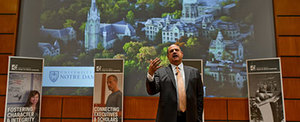Deloitte CEO says integrity is key to global recovery
Published: November 2, 2012 / Author: Ed Cohen

The CEO of one of the world’s largest accountancy and
professional-services firms said the finance industry’s reputation has fallen
so far, it’s now on a par with medicine … five centuries ago.
“Finance is where medicine was 500 years ago. If you went to
see a doctor, you were just as likely to be killed as cured,” said Barry
Salzberg, global CEO of Deloitte Touche
Tohmatsu Ltd., in a talk at the University of Notre Dame’s Mendoza College
of Business on Nov. 2.
The CEO, who was quoting a professor from the Cambridge
University Judge School of Business, oversees a firm that employs more than
200,000 professionals in more than 150 countries. His talk, part of the College’s
Boardroom
Insights Lecture Series, preceded the formal dedication of the Notre
Dame Deloitte Center for Ethical Leadership, a new academic center at the Mendoza College of Business made possible by
a generous gift from professional services organization. The center focuses on
advancing ethical leadership in business, including research, thought
leadership and the dissemination of practical ethics-related content to the
business community in the United States as well as around the world.
Salzberg shared what he termed “sobering statistics” about mistrust
of business and government that persists in the wake of the global financial
crisis. He said a recommitment to integrity is the key to rebuilding both trust
and the world economy itself.
“In the United States, just 50 percent of those polled last
year … said they trust business to do what is right,” he said, adding that this
actually represented a “modest uptick” in contrast to sharp declines in Spain,
Germany and other countries.
“This survey also found that government leaders are now the
least-trusted spokespeople in the world, and in both 2011 and 2012, banks and
financial services were the least-trusted business sectors.”
On a more hopeful note, the global CEO said he sees
remarkable similarities in the values and principles that guide business around
the world. He related a Chinese proverb and admonitions from Aristotle and
Thomas Jefferson on the importance of ethics and integrity.
“Each comes from a different part of the word, but the
messages are exactly the same. Culture and business practices are different
depending on where you are in the world … but there’s much more that unites us,
and these shared values and principles are the foundation upon which the robust
global economy can be rebuilt.”
Salzberg talked about how Deloitte and other organizations
work to build “ethical muscle” in their employees” using case studies and
simulations. The idea is to empower employees to raise their voices “when
things just don’t feel right.” He said Deloitte constantly reminds employees
that when they encounter possible insider trading, corruption, improper billing
and other ethical dilemmas, they are not alone. There are people within the
organization they can turn to for advice.
The CEO issued three challenges to students for integrating
ethics into their future professional lives:
- Stay true to your values and find an organization
that shares them; - See yourself as a steward of the economy. (“It’s
your responsibility to protect it, strengthen it, keep it safe, and make it
better than how you found it”); and - Make integrity, trust and transparency part of
your personal brand.
“Remember, these qualities don’t change with circumstance or
location. They’re about doing the right thing, even when no one else will
know.”
/news_and_events/news_articles/article/12191/deloitte-ceo-says-integrity-is-key-to-global-recovery




